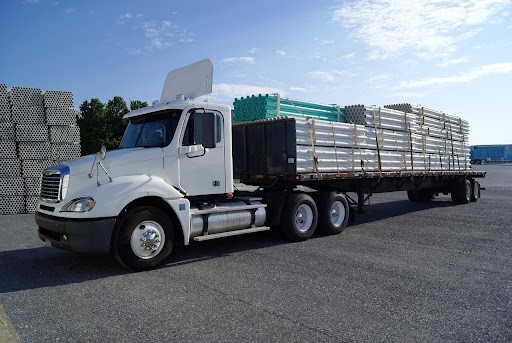The trucking industry relies on its safety regulations to protect drivers, cargo, and the general public. In this blog post, we’ll talk about the importance of adhering to safety regulations, […] The post Ensuring Compliance with Safety Regulations in...
 The trucking industry relies on its safety regulations to protect drivers, cargo, and the general public. In this blog post, we’ll talk about the importance of adhering to safety regulations, and we will also provide some detailed insights into strategies for ensuring compliance. By providing insights and practical tips, this post aims to empower trucking professionals and industry stakeholders with the knowledge and tools necessary to navigate the complex landscape of safety regulations and effectively prioritize the well-being and safety of everyone involved. Let’s dive in!
The trucking industry relies on its safety regulations to protect drivers, cargo, and the general public. In this blog post, we’ll talk about the importance of adhering to safety regulations, and we will also provide some detailed insights into strategies for ensuring compliance. By providing insights and practical tips, this post aims to empower trucking professionals and industry stakeholders with the knowledge and tools necessary to navigate the complex landscape of safety regulations and effectively prioritize the well-being and safety of everyone involved. Let’s dive in!
Overview of Safety Regulations in the Trucking Industry
To understand the significance of compliance, it is essential to have a comprehensive overview of the key safety regulations in the trucking industry.
Some of the prominent safety regulations include hours-of-service regulations, which limit the number of hours a driver can operate a commercial vehicle to prevent driver fatigue. Other regulations focus on vehicle maintenance requirements, such as regular inspections and proper record-keeping, to ensure that trucks operate safely. Additionally, safety regulations encompass rules related to driver qualifications, cargo securement, and hazardous materials transportation.
Non-compliance with these regulations can have severe consequences, including penalties, fines, and reputational damage.
Strategies for Ensuring Compliance
To mitigate compliance risks, trucking companies can implement several effective strategies:
First and foremost, a comprehensive safety program should include driver training programs to educate drivers about safety regulations, defensive driving techniques, and proper cargo handling procedures. Vehicle maintenance protocols should be in place to ensure regular inspections, repairs, and record-keeping. Incident reporting procedures should be established to promptly address and document any safety-related incidents. Regular audits and inspections are also vital to identify areas that require improvement and ensure ongoing compliance. Technology can play a significant role in monitoring driver behavior, vehicle performance, and adherence to safety regulations, enabling companies to address potential compliance issues proactively.Insurance Considerations
Trucking companies must have the right insurance policies in place to protect against potential risks and liabilities. Commercial vehicle insurance can be essential to cover damages in case of accidents. Cargo insurance is a crucial aspect of protecting your goods during transportation. It provides coverage against theft, damage, or loss, ensuring that you are financially protected in case of any unforeseen incidents.
However, it’s not just cargo insurance that trucking companies should consider. Environmental liabilities, workers’ compensation, and cyber risks are other important aspects that require insurance coverage. Addressing these potential risks can safeguard your business and ensure its longevity.
Once you have chosen a business name, it is important to go through the official registration process. This step involves filing the necessary paperwork with the appropriate government agency in your jurisdiction. By registering your business name, you not only establish your legal right to operate under that name, but also gain recognition from authorities. This recognition protects against potential conflicts or infringements, giving your business a solid foundation.
Having the right insurance coverage and completing the registration process are vital steps in building a successful business. They not only mitigate financial risks but also provide peace of mind and financial security. With these measures in place, you can focus on growing your business and navigating any challenges that may come your way.
The Effects of Prioritizing Safety

Compliance with safety regulations goes beyond legal obligations; it yields numerous benefits for trucking companies. Prioritizing safety can lead to improved outcomes, including reduced accidents, injuries, and cargo damage. By demonstrating a commitment to safety, companies can enhance their reputation and build trust with customers, which can result in increased business opportunities and customer loyalty.
Compliance also helps companies avoid legal and financial implications associated with non-compliance, such as costly fines, legal battles, or loss of business licenses. Overall, compliance with safety regulations is critical in ensuring trucking operations’ long-term success and sustainability.
Challenges in Ensuring Compliance
Ensuring compliance in the trucking industry comes with a multitude of challenges. The industry operates in a highly intricate and dynamic environment, with trucking companies handling a wide range of cargo, navigating through diverse and complex routes, and closely collaborating with numerous stakeholders. It is essential to acknowledge and effectively tackle these challenges to maintain a high level of compliance and mitigate the risk of incurring penalties or suffering reputational harm.
One significant challenge is the need for comprehensive driver training. Insufficient training for drivers can significantly impact compliance efforts. It is crucial to ensure that drivers are adequately trained on safety protocols, regulations, and best practices to minimize the risk of non-compliance incidents.
Another challenge lies in establishing proper maintenance protocols. Inadequate maintenance practices can lead to equipment malfunctions or failures, which can compromise compliance. Implementing robust maintenance procedures, including regular inspections, repairs, and upkeep, is vital for preventing compliance issues related to equipment.
Moreover, keeping up with regulatory changes poses a constant challenge for trucking companies. The trucking industry is subject to a myriad of regulations that are regularly updated or modified. Failing to stay informed and adapt to these changes can result in non-compliance. It is crucial for companies to monitor regulatory updates, maintain open communication channels with regulatory bodies, and promptly implement any necessary changes to ensure ongoing compliance.
Final Thoughts
By adhering to these regulations, companies can protect their drivers, cargo, and reputation while minimizing legal and financial risks. It is crucial for trucking companies to establish a comprehensive safety program, provide ongoing training and education, conduct regular audits and inspections, and utilize technology for monitoring and compliance. Moreover, compliance with safety regulations leads to improved safety outcomes, enhances reputation and customer trust, and helps avoid legal and financial implications associated with non-compliance. Lastly, maintaining proper insurance coverage is essential for managing risks and protecting against potential liabilities. By adopting these strategies and demonstrating a commitment to compliance, trucking companies can navigate the complex landscape of safety regulations and thrive in a competitive and compliant manner.
The post Ensuring Compliance with Safety Regulations in Trucking Operations appeared first on Gauge Magazine.














